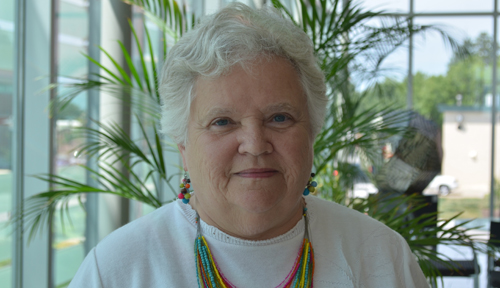UNMC researchers may have found a way physicians can predict ovarian epithelial cancer in the near future.
Eleanor Rogan, Ph.D., chairwoman of environmental, agricultural and occupational health in the College of Public Health, believes that epithelial ovarian cancer is initiated by an imbalance in estrogen metabolism.
“For women who experience late menopause and never gave birth, risk factors are high because the resulting unbalanced estrogen metabolism can generate DNA damage and mutations that start the process leading to ovarian cancer,” she said.
Dr. Rogan said she thinks she has found how ovarian cancer starts and may be on track to learning how to reverse the process. Results will be printed in an upcoming issue of the International Journal of Cancer.
The study, funded by a two-year $375,000, Idea Development Award from the U.S. Department of Defense Ovarian Cancer Research Program, was selected to be highlighted in the prestigious 2013 Ovarian Cancer Research Program book by the Congressionally Directed Medical Research Programs.
The National Cancer Institute estimates that this year 22,240 new cases of ovarian cancer will be diagnosed and 14,030 women will die of ovarian cancer in the United States. Ovarian cancer causes more deaths than any other cancer of the female reproductive system. Ovarian epithelial cancer is a disease in which malignant (cancer) cells form in the tissue covering the ovary.
There is no early detection test for ovarian cancer. A Pap smear will not detect it.
Dr. Rogan used urine samples to measure the level of estrogen-DNA adducts in women with and without ovarian cancer. She detected significantly higher levels of estrogen-DNA adducts in the samples with ovarian cancer. The high ratio of estrogen-DNA adducts to estrogen metabolites and conjugates that she observed in samples from women with ovarian cancer indicated that estrogen metabolism was unbalanced in these women.
She also found that these levels are associated with polymorphic variants of key enzymes in the pathways of estrogen metabolism.
“The resulting imbalance is what we think starts the process of ovarian cancer.”
Dr. Rogan says that the results of this study, “suggest that analysis of a urine sample for specific estrogen compounds can indicate whether a woman is at low or high risk for cancer or has the disease. In addition, these results suggest that rebalancing estrogen metabolism could reduce the risk of developing cancer.”

incidence of ovarian cancer is around 22,000 new cases per year. The article claims a 1/4 million (250,000) new cases per year.
I strongly believe that my Clear Cell Ovarian carcinoma was a result of my estrogen imbalance.Gynecologists need to know how to detect and interpret hormone imbalance in women.Then learn what to do about it.